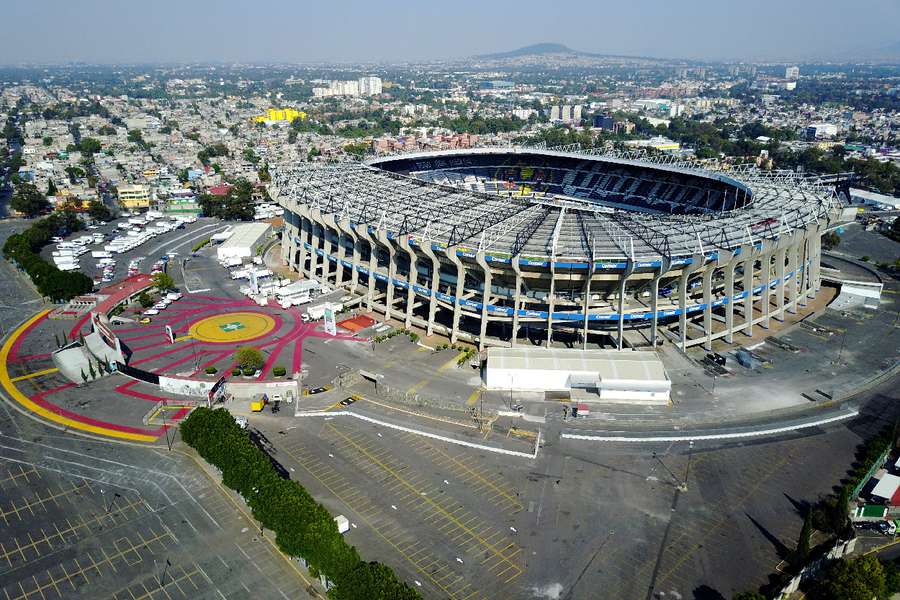2026 World Cup final to be held in New Jersey; Azteca Stadium in Mexico to host opening game
The grand finale of the 2026 World Cup is set to unfold in New Jersey at the MetLife Stadium, home to both the National Football League’s New York Giants and New York Jets, as declared by FIFA on a recent Sunday. This announcement was accompanied by the release of the complete schedule for the highly anticipated global football spectacle. Scheduled to culminate on July 19th, this 48-team World Cup is distinctive for being co-hosted by the United States, Mexico, and Canada.
The MetLife Stadium, with its expansive open-air setting and a seating capacity of 82,500, is earmarked to host the pinnacle of the tournament – the World Cup final. Notably, this venue previously hosted the Copa America Centenario final in 2016, an event etched in history as Chile triumphed over Lionel Messi’s Argentina in a dramatic penalty shootout.
Mexico City’s iconic Estadio Azteca is bestowed with the honor of hosting the opening match on June 11th, marking a historic moment as Mexico becomes the first nation to host the World Cup for the third time. The significance of Estadio Azteca in World Cup history is underscored by its role as the venue for the climactic encounters of the 1970 and 1986 editions. In 1970, Pele’s Brazil orchestrated a dominant 4-1 victory over Italy in the final, while 1986 saw Diego Maradona’s Argentina emerge triumphant in a thrilling 3-2 contest against West Germany. It was at this very stadium that Maradona etched his name in football folklore with the infamous ‘Hand of God’ goal and the mesmerizing ‘Goal of the Century’ during Argentina’s 2-1 quarter-final victory over England in 1986.
Shifting focus to Canada, which is hosting its first-ever World Cup games, the tournament’s inaugural match on June 12th is set to take place in Toronto. The venue for this historic moment will be the home ground of the city’s Major League Soccer team. Meanwhile, the United States will kick off its World Cup journey with the opening game scheduled to be held in Los Angeles, hosted at the home stadium of the NFL’s Rams.
Real-time Football scores and highlights.
Diving Deeper into the Significance:
- MetLife Stadium as the Epicenter:
- The MetLife Stadium, situated in East Rutherford, New Jersey, emerges as the focal point for the climax of the 2026 World Cup.
- With its vast open-air expanse and a seating capacity of 82,500, the stadium promises to provide an electrifying atmosphere for the grand final.
- Co-Host Nations Unite:
- The 2026 World Cup stands out as a collaborative effort among three North American nations – the United States, Mexico, and Canada.
- The shared responsibility of hosting reflects a unified approach to showcase the global appeal of football on the North American stage.
- Estadio Azteca’s Illustrious History:
- Mexico City’s Estadio Azteca, chosen for the tournament’s opening match, carries a rich legacy as a World Cup venue.
- Hosting the finals of the 1970 and 1986 editions, it witnessed iconic moments, including Pele’s brilliance and Maradona’s unforgettable feats.
- Mexico’s Third Stint as Host:
- Mexico’s selection as a host for the third time underscores the nation’s enduring passion for football and its standing as a key player in the global sporting landscape.
- Historic Moments in Estadio Azteca:
- The venue’s history is punctuated by Maradona’s legendary ‘Hand of God’ goal and the ‘Goal of the Century,’ etching unforgettable chapters in football lore.
- Canada’s Maiden World Cup Experience:
- Canada’s debut as a World Cup host is a landmark moment, symbolizing the expanding footprint of football in the country.
- The choice of Toronto as the location for the inaugural match adds significance, highlighting the city’s growing prominence in the sports landscape.
- United States’ Opening Game in Los Angeles:
- The United States, a key player in the joint hosting, initiates its World Cup campaign with an opening match in Los Angeles.
- The selection of the home stadium of the NFL’s Rams as the venue reflects a strategic choice to engage a diverse and enthusiastic audience.
FIFA’s Vision and Global Impact:
- Global Football Extravaganza:
- The release of the 2026 World Cup schedule marks the beginning of the countdown to a global football extravaganza of unprecedented scale.
- FIFA’s strategic choice of venues across North America underscores the aim to showcase the sport’s universal appeal on a grand stage.
- Unity Through Football:
- The collaborative hosting by the United States, Mexico, and Canada represents a unity of nations through football, transcending borders and fostering a shared celebration of the beautiful game.
- MetLife Stadium’s Legacy:
- MetLife Stadium, already a witness to significant football events, is poised to add another chapter to its legacy as it hosts the pinnacle of the 2026 World Cup.
- The stadium’s capacity and state-of-the-art facilities make it a fitting stage for the crowning moment of a tournament that unites nations.
- Cultural Impact of World Cup Hosting:
- The selection of diverse cities, each with its own cultural tapestry, as host venues reflects FIFA’s commitment to showcasing the global diversity that enriches football.
- Historical Significance of Open-Air Finals:
- The decision to host the World Cup final in an open-air stadium amplifies the sense of spectacle, allowing fans to be immersed in the atmosphere of a truly grand occasion.
- Expanding Football Frontiers in North America:
- Canada’s inclusion as a host marks a significant step in expanding football’s frontiers in North America, contributing to the sport’s growth in the region.
- Strategic Venue Choices:
- The selection of Estadio Azteca for the opening match acknowledges its historical significance, while the choice of Toronto and Los Angeles aligns with the vision of engaging diverse audiences and fostering a truly global celebration.
Each of the designated host nations will participate in the group stage matches within their respective borders. The United States, specifically, will confine its group stage fixtures to the West Coast, engaging in two matches in Los Angeles and one in Seattle.
Canada, on the other hand, will partake in one group stage encounter in Toronto, followed by two matches in Vancouver. Mexico’s group stage participation will unfold with two matches at Estadio Azteca and one at Guadalajara.
The dynamics of the tournament will undergo a notable shift as it progresses to the quarter-final round, exclusively transitioning to the United States. The quarter-final matches are slated to take place in prominent cities such as Los Angeles, Kansas City, Miami, and Boston.
The semi-final stage will unfold at Dallas and Atlanta, serving as the hosts for these pivotal encounters. Subsequently, Miami will be the chosen venue for the third-place playoff. Adding a touch of historical significance, Philadelphia is set to host a Round of 16 match on July 4th, coinciding with the 250th anniversary of the Declaration of Independence.
In a departure from the traditional format of 64 games, the 2026 World Cup will feature an expanded total of 104 matches. This augmentation is attributed to the earlier decision to broaden the team participation from 32 to 48, necessitating an additional knockout round.
As the intricate details of the tournament unfold, the extended format, diverse host cities, and strategic scheduling promise to elevate the 2026 World Cup into a monumental sporting spectacle. The geographical dispersion of matches across North America and the incorporation of significant historical landmarks add layers of complexity and excitement to the eagerly anticipated football extravaganza.







